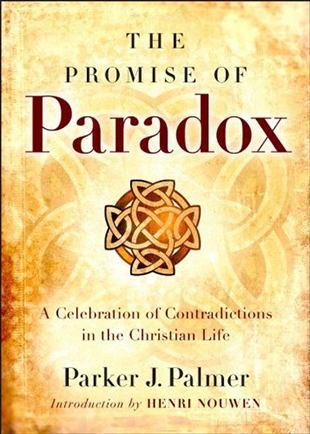The Gospel of Abundance
"For those of us who are relatively affluent, scarcity and abundance turn out to be spiritually rooted issues, not conditions external to our lives. When we cling to the world's resources — material or otherwise — we create external scarcity. But that scarcity is a reflection of our inner condition, a condition in which we try to make meaning and assuage our fears by clinging. Of course, the more we cling, the more meaning recedes and fear triumphs: no matter how much we have, we always 'need' more.
"In contrast to this grasping at life is the emphasis on 'letting go' that is central to all great spiritual traditions. In Zen Buddhism, the path is one of constantly emptying the vessel, of not letting the mind hold on to any idea or experience or desire or image. In all the Eastern meditative disciplines, the key is to relax and release the will, to let go of all false securities, in order to rest in the power of reality and truth.
"The same path is found at the heart of Christianity. At the core of the Gospel, there is a constant emphasis on trusting God's abundance and living beyond our fears of scarcity. 'See how the lilies grow,' says Jesus,
they do not toil, or spin, and yet I tell you that even Solomon in all his glory was not arrayed like one of these. If God, then, so clothes the grasses which live today in the fields and will feed the ovens tomorrow, will he not be much more ready to clothe you, men of little faith? You should not be asking, then, what you are to eat or drink, and living in suspense of mind; it is for the heathen world to busy itself over such things; your Father knows well that you need them. No, make it your first care to find the kingdom of God, and all these things shall be yours without the asking. (Luke 12: 26-31)
"At the heart of letting go is faith and trust. If we do not trust that God 'knows well that you need them,' we will grasp at life's necessities and even at luxuries. Lacking faith that God will provide, we can only hoard against an uncertain tomorrow. But what is the warrant for trust when the world is full of examples that would make trust the lifestyle of fools? Is it not prudent to be suspicious, to take nothing for granted, to compete for more than our share, to hoard against future threats? As long as even a minority of people operate this way, they create a climate in which trust itself seems untrustworthy.
"Perhaps this situation — with its self-fulfilling anxieties and its illusions of material security — is part of God's providence. For it is precisely by thinking that we can buy our security, and then by experiencing the loss of all that 'moth and rust doth corrupt,' that most of us are given a chance at conversion. Most of us learn about the paradox of scarcity and abundance only when we are broken in our efforts to put money or status or material well-being in that cavern of need that can only be filled by God.
"And what is this paradox? Simply that 'he who seeks his life shall lose it, and he who loses his life . . . shall find it.' True abundance comes not to those set on securing wealth but to those who are willing to share apparent scarcity in a way that creates more than enough. Those who seek well-being, who grasp for more than their share, will find life pinched and fearful. They will reap only the anxiety of needing more and more, fueled by the fear that someday everything will be taken away. But those who reach out in service to their brothers and sisters, knowing that true abundance is found not in hoarding but in community, will find a life of plenty. Having been there for others, they have reason to believe that others will be there for them.
"Surely this is a conversion — literally, 'a turning' — for it takes the world's logic of scarcity and turns it upside down. Grasping brings less; letting go brings more. What God wants from our fear of scarcity is not a voracious capitalism but the spiritual insight that we cannot buy the identity and security we seek. Those will come to us only as we let go and live in God's grace, which means living in solidarity with those for whom scarcity is no illusion but a matter of life and death.
"As we who have more than enough move toward this solidarity, we will learn that people who live with material scarcity often understand spiritual abundance far better than we do. These people, who have always had to transcend in trust the world of scarce resources, will turn out to be our guides on the spiritual journey. They are the ones to whom Jesus was closest. They are the last whom the Gospel makes first. In their lives, the paradox of scarcity and abundance is made manifest for all who have ears to hear and eyes to see."
